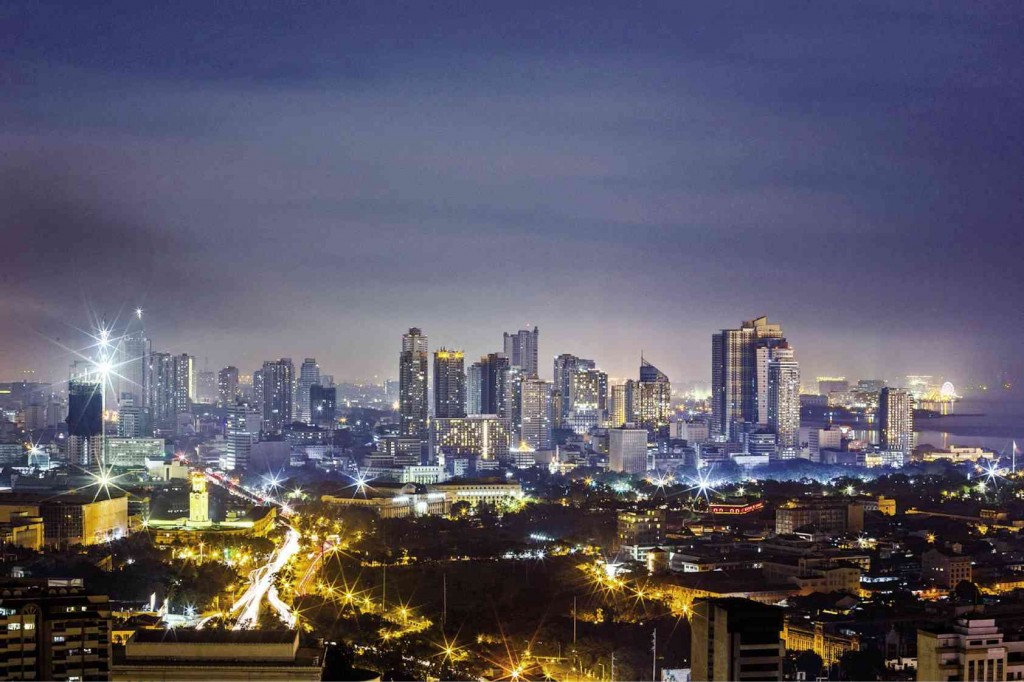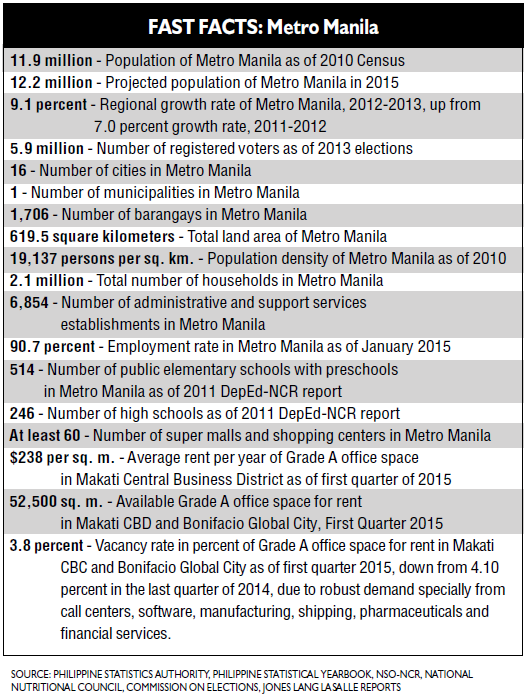Metro Manila makes it to top 30 megacities list

30TH BEST IN THE WORLD Metro Manila sparkles at night as befits its recent inclusion among the “Global Top 30,” an elite roster of the world’s most populous, productive and connected cities, according to the global property consulting firm Jones Lang Lasalle (JLL). The JLL cited Metro Manila’s economic scale, vast population, large gross domestic product and BPO specialization as its competitive edge. JILSON SECKLER TIU
Metro Manila has made it to the “Global Top 30,” a roster of the world’s most populous, productive and connected cities as ranked by global property consulting firm Jones Lang Lasalle (JLL).
The Philippine capital is now in 30th place in JLL’s global ranking, rising from 37th in 2013 and joining the top tier of the world’s 300 leading cities for the first time, London-based JLL global research director Jeremy Kelly said in a presentation at the Asia CEO forum on Thursday.
Global Top 30 is a subset and the top tier of JLL’s Global 300 cities, deemed the bedrock of global commercial real estate activity in the world.
The global ranking is derived from a weighted basket of variables covering population, GDP, corporate presence, air connectivity, commercial real estate stock and real estate investment volumes.
The JLL Top 30 includes “supercities” like Tokyo, New York, London and Paris and “mature” cities like Los Angeles, Chicago, Washington, Hong Kong, Atlanta, Dallas, Singapore, San Francisco, Houston, Toronto, Boston, Sydney and Frankfurt.
It also includes “emerging” cities like Seoul, Shanghai, Beijing, Moscow, Sao Paulo, Jakarta, Istanbul, Guangzhou, Bangkok, Mexico City, Delhi and Mumbai.
Infra immediate priority
But as Metro Manila takes the central stage globally, it faces big challenges in trying to secure its new position in the global hierarchy of cities.
Kelly said in a press briefing that improving infrastructure in Metro Manila should be the immediate priority, as every city in the world strives to keep up with the frenetic pace of urbanization.
Crucial to this agenda is building an efficient mass transportation system, Kelly said.
Economic scale
And beyond having a formidable business process outsourcing (BPO) industry, he said, the metropolis should take advantage of the fertile environment to boost productivity and evolve into a technology hub.
“Manila’s increasing reach in terms of BPO activity is clearly massively important but what it needs to do is to leverage that and so to evolve not just as a BPO location but to evolve fundamentally as a technology hub,” Kelly said. “Migration is very important. It’s the tipping point here.”
What makes Metro Manila competitive, Kelly said, is principally its economic scale, having a vast population and large gross domestic product (GDP) alongside a globally recognized BPO specialization.
“Manila has that demographic ticket,” Kelly said.
‘Tech-rich’ city
Even small cities can attain a global reach if they are good in something, Kelly said, and Metro Manila has already done so in the BPO industry.
To move up the value chain, however, Kelly said Metro Manila must become a technology hub, harnessing its potential as a “tech-rich” city.
A tech-rich city is one whose economy is anchored on various technology-related industries ranking from the basic call centers to high-value research and development (R&D), he said.
“I think Manila is building a profile across that range of the value chain. It’s epitomized by Silicon Valley and San Francisco Bay area, cities with very dynamic millennials and start-up companies,” he said.
Among the emerging markets, he said Bangalore and Manila were among the promising technology hubs.
21st-century cities
The world’s top corporations are drawn to cities with new ideas, new strengths, ones that are creating new jobs for the 21st century and are competitive and resilient, Kelly said during his presentation.
Metro Manila is in a “sweet spot of growth and momentum, reaping the benefits of economic reforms, improving macro[economic] fundamentals, global specialization and [sovereign] investment grade rating,” he said.
Further rise
Kelly added that the Philippines was making steady progress not just based on the JLL’s perspective but in many other global indices drawn up by other institutions.
“It’s a city in its ascendancy,” he said.
After making the Global Top 30 list, Metro Manila is seen as rising to the 25th position by 2020 and further to 18th position by 2030.
RELATED STORIES
